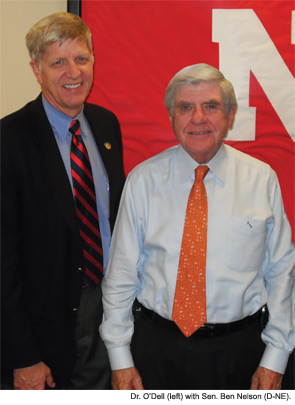

Anyone who knows me is aware of my great passion for the Nebraska Cornhuskers football team. I begin each season with unadulterated hope and excitement, confident that the team can go all the way to the national championships. The end of the season can be anticlimactic, as it was last year where we ended up 9 and 4 with no championship title. But 2012 brings a new season for the Huskers, a second go-round in a new conference with a fresh chance at victory, and I am hopeful, as ever, that this might be our best year this century. Such is the never-ending cycle of a sports fan. I tell you this because I find many similarities between the highs and lows of following your favorite sports team and the saga of policy making on Capitol Hill.
Advocating for Rheumatology
For the past decade, I have made a number of trips annually to Washington, D.C., to take part in an essential element to advancing our profession: advocacy. After years of meeting with staffers and lawmakers on Capitol Hill, I can clearly see the progress we are making and the relationships that we are building, and understand why it is so imperative that the ACR remain focused on developing our advocacy team.
Lately, when I enter the offices of my Senators or my Congressman, I am often greeted on a first-name basis. This is because, like many of you, I have invested in the development of these relationships by visiting with my lawmakers both in D.C. and at home, offering my assistance on issues and letting them know where rheumatology stands on health policies. There are many advantages to these relationships.
Like so many things in life, it really is all about personal connections. Recently, we at the Omaha VA had a major issue with a new national research policy that could have been detrimental to veterans and resulted in research being halted. A call to a contact in one of my senators’ offices promptly resulted in this policy being overturned. It was because of the personal relationship I had with my senator and this particular staffer that we were successful in stopping a bad policy from being implemented.
When I started visiting Capitol Hill with the ACR years ago, it was inevitable to get a blank stare and that dreaded question, “So, what is a rheumatologist?” I would spend half of my meeting talking about my training and the myriad conditions rheumatologists manage. The ACR recognized this problem and ramped up its advocacy efforts over the years. The ACR’s annual fly-in, Advocates for Arthritis, has gone from 36 attendees in 2006 to more than 120 rheumatologists, health professionals, and patients visiting 200 congressional offices in 2011. We’ve increased the frequency with which we visit Capitol Hill, giving rheumatologists the opportunity to build relationships with lawmakers and their staff. The ACR’s public relations campaign, Simple Tasks, is also building greater awareness of rheumatology on Capitol Hill and beyond.
RheumPAC Six Years Old and Growing
Another tool the ACR has used to put rheumatology on Congress’ radar is our political action committee. In the last five years, I’ve personally seen the doors that are opened to us through RheumPAC. I had the opportunity to deliver a RheumPAC contribution to Rep. Lee Terry (R-NE). I met him at a local restaurant and chatted with him for 45 minutes about rheumatology, our concerns with the Independent Payment Advisory Board (IPAB), issues with the Physician Quality Reporting System, reimbursement, and research funding. This one-on-one interaction is invaluable and has resulted in a much greater recognition of rheumatology and our issues. Rep. Terry now calls me by name and understands more about the important things we do.
RheumPAC turned six this year and has grown in leaps and bounds since its inception. We raised more than $100,000 in 2011 and have a goal of $125,000 in 2012. Although our subspecialist colleagues in gastroenterology, cardiology, and oncology have been participating in the political process much longer than rheumatology, we are making great progress. Just as their political action committees have increased recognition of the importance of specialty care for GI issues, heart disease, and cancer, RheumPAC is doing the same for rheumatology and arthritis and rheumatic diseases. RheumPAC is not about ideology or personal philosophy, blue or red, liberal or conservative—it’s about rheumatology and how we can positively impact health policy to improve conditions for our profession and our patients.
I know many of you are thinking, “That’s great, Jim, but I don’t get involved in politics.” But you should remember that by choosing the medical profession, you are placing yourself in the middle of the political realm. Particularly in this current environment, there are few, if any, professions more affected by policy than medicine. Whether you are in academics, private practice, research, or pediatrics, the way you treat your patients, practice medicine, receive grants for your research, and are paid for your services is directly affected by policies enacted by Congress.
Just like the ups and downs of any sports season, this year’s congressional session has had its fair share of highs and lows. Rheumatologists secured the introduction of legislation that limits excessive cost-sharing for specialty drugs, saw the passage of IPAB repeal and medical liability reform by the House of Representatives, and watched the progress of bicameral legislation that will help identify drug shortages and mitigate their impacts. But, we’ve also been hit with the Sustainable Growth Rate can being kicked down the road yet again, the fall of dual-energy X-ray absorptiometry reimbursements, and research grants not expanding.
It is up to each one of us to make the effort to pick up the phone, send an e-mail, attend a meeting or town hall, participate in RheumPAC, or come to Washington, D.C. … The time for sitting on the sidelines is over.
Securing a Bright Future
While many of our advocacy efforts focus on improving the current policy climate for medicine, we must also concentrate on securing a bright future for the next generation of rheumatologists. Protecting graduate medical education funding and expanding and supporting adult and pediatric fellowship programs must continue to be priorities for the ACR. As division chief at the University of Nebraska Medical Center, I see the importance of teaching our fellows in training that advocacy is a part of being a rheumatologist and essential to the continuation of our subspecialty.
If you are in research, private practice, physical therapy, or a fellow right out of training, we are all members of the same team with the same goal: ensuring the long-term viability of our subspecialty and providing arthritis and rheumatic disease patients with top-quality, high-value care. It is time for us to unite and ensure that every member of Congress knows that rheumatologists are engaged and paying attention to the policies being debated. If you want to change the way cognitive specialists are reimbursed, you have to be involved. If you want to ensure that the National Institutes of Health is appropriately funded so we can continue to develop new treatments and cures, you have to talk to your lawmakers. If you want to ensure the viability of the rheumatology subspecialty, we all have to get in the game.
If we are not talking to members of Congress about these issues, who is? The reality is that the insurance companies, trial attorneys, and our colleagues in the procedural specialties aren’t taking a time out. We must continue to educate lawmakers on the value of rheumatology, the improved outcomes we provide for our patients, and the benefits of innovative treatments that come from biomedical research. As Vince Lombardi said, “People who work together will win, whether it be against complex football defenses, or the problems of modern society.” It is up to each one of us to make the effort to pick up the phone, send an e-mail, attend a meeting or town hall, participate in RheumPAC, or come to Washington, D.C., to impact the policies that affect our patients and our subspecialty. We owe it to our profession and, most importantly, to our patients. The time for sitting on the sidelines is over.
Dr. O’Dell is director of the Internal Medicine Residency Program and division chief of rheumatology at the University of Nebraska, Omaha and the Omaha VA medical centers. Contact him via email at [email protected].
